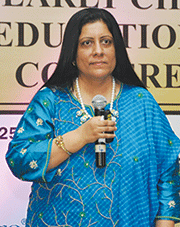 EARLY CHILDHOOD CARE AND education (ECCE) is a step child of Indian education, indifferently nurtured by the Union ministries of women and child development, human resource development and finance.
EARLY CHILDHOOD CARE AND education (ECCE) is a step child of Indian education, indifferently nurtured by the Union ministries of women and child development, human resource development and finance.
Of the country’s 158 million children aged below six, 75.7 million i.e. 48 percent are reported to be covered under the Central government’s Integrated Child Development Services (ICDS) programme, which provides early years nutrition for infants and lactating mothers in 1.6 million anganwadi centres, which are also mandated to provide elementary ECCE. In addition, another 10 million 0-6 age group children are provided ECCE by the country’s estimated 300,000 private sector preschools and NGOs.
Over half of India’s children in the 0-6 age group are deprived of any early childhood care despite the Constitution and Parliament having acknowledged the importance of ECCE. Article 45 of the Constitution directs that “the State shall endeavour to provide ECCE for all children until they complete the age of six years”. Even the well-publicised Right of Children to Free and Compulsory Education (RTE) Act, 2009 mandates that “the appropriate government may make necessary arrangement for providing free preschool education for such children”.
Yet despite these constitutional directives and parliamentary legislation proclaiming the importance of ECCE, the plain truth is that after 65 years of independence we have no defined, documented ECCE policy, no curriculum framework for preschools and no qualifications prescribed for teachers. The quality of non-formal preschool/ early childhood care and education imparted through multiple providers is uneven, and varies from a minimalist approach to alarmingly accelerated academic programmes. This is largely an outcome of lack of comprehension of the purpose of ECCE, its philosophy and importance among all stakeholders. This situation is exacerbated with inadequate institutional capacity, and absence of standards, regulatory norms and mechanisms.
Under pressure from educators, EducationWorld and representative organisations such as the Early Childhood Association (ECA, estb. 2010), the Union ministry of women and child development drafted a National Early Childhood Care and Education Policy (NECCE) which was approved by the Union cabinet last September. Yet at best the NECCE policy is just a vision document, a collection of correctly worded sentences which fails to outline a strategy or course of action. It’s a moot point when Parliament will enact it into legislation given that a general election is imminent and a new Parliament will be sworn in within six months.
If we don’t stand up for children, we don’t stand for much. Sadly, in contemporary India no one stands up for children. This is reflected in the low, if any, priority given to education in party manifestos and budget allocations. Without well-drafted policies and laws to define care and quality, anganwadis and even private preschooling won’t have the impact and reach required to universalise ECCE to secure the country’s future. All stakeholders in pre-primary education need to learn about their roles and the goals of ECCE. Without clarity of purpose, there’s serious risk of another ‘brain drain’ in the early childhood years, when 98 percent of the brain develops. The vast differences in the early education experiences of children attending government anganwadis and private preschools make it unlikely that two children will ever perform equivalently in primary-secondary school, and later in employment. More purposeful advocacy for early childhood education must articulate its historical strengths and huge potential for the development of the world’s largest child population, denied a fair deal in contemporary India.
The newly formulated NECCE policy will be a non-starter, unless important issues such as minimum qualifications for early childhood teachers and rigorous in-service training to enable them to understand the theory and practice of ECCE, and minimum wages for teachers are addressed. There should be no distinction between government and privately provided ECCE programmes. Every child deserves the best start in life and if parents are unable to provide it, responsibility devolves upon the Central and state governments.
To ensure that even if belatedly, all children under age five receive acceptable quality early childhood education, the NECCE policy needs to involve all early childhood educators and associations in the task of policy development and implementation. Children may be just 20 percent of the population today, but they are 100 percent our future. Therefore the national imperative to invest the NECCE policy with meaning and purpose brooks no delay.
(Swati Popat Vats is president of the Early Childhood Association of India)